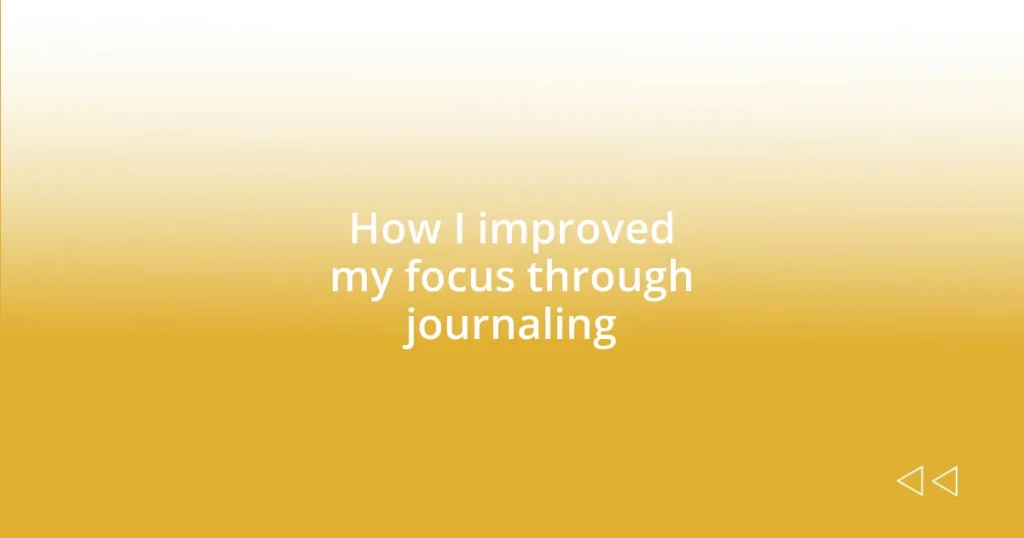Key takeaways:
- Focus and productivity are skills that can be cultivated through intentional practices like journaling, which aids in organizing thoughts and reducing distractions.
- Creating a consistent journaling routine enhances clarity, goal structuring, and emotional release, contributing significantly to improved focus.
- Overcoming common journaling challenges, such as finding time and dealing with perfectionism, can be achieved by embracing imperfections and experimenting with prompts.
- Tracking progress in journaling helps in recognizing personal growth and correlates mood with productivity, reinforcing the importance of accountability in maintaining focus.

Understanding focus and productivity
Understanding focus and productivity is crucial in today’s fast-paced world. I often find myself reflecting on how easily distractions can pull me away from important tasks. Have you ever been knee-deep in work, only to realize that an hour has slipped away because of your phone buzzing in the background? It’s maddening how the smallest interruptions can derail our productivity.
There was a time when I struggled to stay on task for even 30 minutes. I vividly remember sitting at my desk, surrounded by my notes, but my mind would wander to everything from lunch plans to random thoughts about the weekend. This experience made me realize that focus isn’t just about concentration; it’s a skill that requires practice and intention. The highs of productive days stand out sharply against those low moments of distraction, don’t they?
I’ve learned that our environment significantly impacts our ability to focus. For instance, I noticed that when I took a few minutes to clear my workspace, my productivity skyrocketed. It seemed simple, yet the clutter around me mirrored the clutter in my mind. By taking a moment to organize, I not only improved my focus but also created space for creativity to flourish. Could there be a connection between our physical surroundings and mental clarity? Reflecting on these questions has deepened my understanding of how to harness focus effectively in my daily life.

Importance of journaling for focus
Journaling has become an essential tool for sharpening my focus. When I put my thoughts and to-do lists on paper, I experience a sense of clarity that’s hard to achieve otherwise. I remember one particularly overwhelming day when I jotted down all my project deadlines. Just like that, the anxiety that had been swirling in my mind transformed into a manageable list. It was like pulling the fog away from my thoughts, allowing me to hone in on what truly mattered.
Moreover, the act of writing helps me to structure my day. When I sit down each morning to plan, I’m not just outlining my tasks—I’m prioritizing my goals. I’ve found that when I allocate time for journaling, I set a more deliberate course for my day. Do you ever feel like you’re just floating through tasks without real direction? I used to feel that way until I integrated journaling into my routine. It helps me break my responsibilities into chunks, making them feel less daunting and more achievable.
The emotional release that comes with journaling plays a huge role in my ability to focus. On days when my thoughts feel chaotic, penning them down provides an outlet. I recall a moment when I felt particularly overwhelmed by personal and professional commitments—it was as if I had a storm brewing inside. Writing allowed me to pour out my feelings, and once I had done that, I could focus more clearly on the tasks ahead. It’s a surprisingly effective way to clear mental space, and it ultimately aids my productivity.
| Benefits of Journaling for Focus | Personal Experience |
|---|---|
| Clarity of Thought | Transforming anxiety into organized tasks |
| Goal Structuring | Prioritizing daily tasks leads to greater focus |
| Emotional Release | Clearing mental chaos enhances productivity |

Setting up a journaling routine
Establishing a journaling routine was a transformative experience for me. At first, I felt hesitant, unsure of how to incorporate it into my day. I began by setting aside just 10 minutes each morning, and that small commitment made all the difference. It wasn’t just about writing; it was about creating a sanctuary for my thoughts where distractions faded away. Have you tried anchoring your day with a few moments of reflection? It’s remarkable how this simple practice can pave the way for improved focus.
To make this routine stick, here’s what worked for me:
- Choose a Consistent Time: Find a time that feels natural—perhaps after waking up or during your lunch break. I found mornings to be the most refreshing.
- Create a Comfortable Space: Ensure your journaling spot is inviting. I picked a cozy corner with good lighting, which instantly made the process more enjoyable.
- Use Prompts: Sometimes a blank page can be intimidating. I started with questions like “What am I grateful for today?” This helped me find direction in my writing.
- Limit Distractions: I turned my phone to silent and put it out of reach. This little action created a barrier against distractions, allowing me to immerse myself in writing.
- Reflect and Revise: Regularly reviewing my entries helped me see my growth and stay engaged with my goals. I found it quite rewarding to look back and acknowledge my progress.
In no time, journaling became a cherished part of my day. I discovered that the more I committed to it, the clearer my thoughts became, sharpening my focus for whatever lay ahead. It’s like having a dedicated time to clear the mind’s clutter, isn’t it?

Techniques for effective journaling
One technique I find incredibly useful is the practice of free writing. Whenever I sit down to journal, I allow my thoughts to flow onto the page without judgment or censorship. I remember the first time I tried this; I poured out everything from my worries about deadlines to random musings about life. The result was a wave of relief. It felt like my mind had been decluttered, making room for clearer focus on the day ahead. Have you ever felt that rush when you finally let go of everything weighing you down?
Incorporating gratitude lists into my journaling was another game-changer. Each evening, I take a moment to reflect on three things I’m grateful for. This simple yet powerful exercise shifts my mindset from stress to appreciation. I remember one night where I wrote about a kind gesture from a colleague and a delicious meal I had—those small moments often reset my perspective. Have you noticed how focusing on the positive can re-energize your mind?
Setting intentions is a technique I swear by as well. At the start of each journaling session, I outline my key goals for the day. The practice became a bit of a ritual for me; I’d light a candle, take a deep breath, and thoughtfully write down what I wanted to achieve. This clarity not only grounds my mind but ignites a spark of motivation. Does taking a moment to declare your intentions resonate with you? In my experience, it shifts my focus from scattered tasks to purposeful actions, letting me tackle the day with renewed vigor.

Tracking progress and reflecting
Reflecting on my journaling journey has taught me how valuable tracking progress can truly be. Each week, I flip through my previous entries and can’t help but smile at how far I’ve come. It’s incredible to see my thoughts evolve over time; I sometimes feel like an observer of my own growth. Have you ever looked back and realized just how much you’ve changed? I remember a moment when I captured my response to a challenging situation. Re-reading it a few months later, I was amazed at the different, more mature perspective I’d developed.
Moreover, tracking my moods and feelings in my journal has provided me with significant insights. When I started noting how I felt on different days, patterns began to emerge. I noticed that the days when I expressed gratitude had a direct correlation with my overall mood and productivity. That revelation was like a lightbulb moment for me. Have you considered how your emotions influence your focus? By tracking these elements, I became more aware of what boosts my concentration and what pulls me away, allowing me to make conscious adjustments to my daily routine.
Finally, setting specific goals and revisiting them weekly has become my go-to method for accountability. I recall jotting down a simple goal—like completing a book—and then tracking my progress. Each checkmark made me feel accomplished, nudging me to tackle the next item on my list. It transformed the goal from a distant dream into something tangible. Isn’t it satisfying to see your efforts laid out before you? This practice not only keeps me on track but also motivates me to keep pushing for improvement, reinforcing my commitment to maintaining focus in all aspects of my life.

Overcoming challenges in journaling
Journaling does come with its share of challenges, and I found that one of my biggest hurdles was simply finding the time to write. Life can get incredibly busy, and I often struggled to carve out those precious moments for myself. One day, after a particularly hectic week, I realized that if I didn’t prioritize my journaling, it wouldn’t happen. So, I began setting a consistent time every morning, even if it was just ten minutes. Have you ever noticed how those brief moments of intentionality can set the tone for the rest of your day?
Another challenge I faced was the fear of not saying the right thing or worrying about how my writing would turn out. I remember staring at a blank page, feeling stifled by the pressure to create something profound. But then I learned to embrace the imperfections of my thoughts. I started telling myself that my journal was a safe space, free from judgment. Have you ever felt that pressure stifle your creativity? Letting go of that expectation was liberating—I discovered that even the simplest sentences held value in documenting my journey.
Lastly, maintaining motivation over time has been an uphill battle at times. Initially, my enthusiasm was off the charts, but after a few weeks, I found my entries becoming sporadic. To reignite my passion, I began incorporating various journaling prompts and challenges. One of my favorites became a fun monthly theme, like ‘the things that make me smile’, which made it feel like a refreshing change. Have you found ways to keep your journaling practice vibrant? This approach not only kept my momentum going but also deepened my connection to the process itself.















